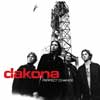Dakona
Genre: Rock
Official Web Site
Dakona Bibliography: (click on each album cover to view tracks and Dakona lyrics)
Dakona Biography Music fans who are tired of the derivative sound of today's indie oeuvre and the gutteral histrionics of mainstream rock fare need look no further than Dakona's Maverick Records debut, Perfect Change, to remind them what a rock band should sound like. The Vancouver-based quartet has a lush, atmospheric quality that combines heady guitar textures with deep, fluid grooves and piercingly beautiful melodies. Their album, produced by Rob Cavallo (Green Day) and Arnold Lanni (Our Lady Peace) and mixed by Randy Staub (P.O.D., Nickelback) and Tom Lord-Alge (Weezer, Avril Lavigne), drives and uplifts with emotionally charged songs of soulful grit and grace.
Dakona came together six years ago, when Ryan McAllister and cousin John Biondolillo teamed up with local players Shane Dueck and Brook Winstanley. The quartet spent the next several years locked away in a decrepit barn-turned-rehearsal space behind McAllister's parent's home, honing their craft and plotting their big move.
Along the way, they built a fastidiously loyal following throughout Canada and Seattle, playing-as McAllister puts it-"anywhere and everywhere, including lunch hour shows at local high schools." "We even played a hospital benefit once where we opened for a sex therapist that was doing a question and answer session for teens," he laughs. "That was a show to remember." In 1998, the blue-collar band went the D.I.Y. route and released Good Enough For Me to rave reviews. Two years later, they followed up with Ordinary Heroes, which became the number one independent-selling album in Vancouver, garnering both local radio play and record company interest. Says Winstanley, "The idea was to make a set of songs that we could shop around, but no one ever told us that we really only needed three or four songs. So we made a 13-song album, which definitely served its purpose."
After fielding offers from a number of labels, they chose Maverick, and headed into a Toronto studio with producer Arnold Lanni. As the band would soon find out recording a major label debut is a heady proposition. "Believe or not, we were still growing as a band," says Ryan. "It was our first experience in a state-of-the-art recording studio which can really be distracting. And in the end we all felt that we needed to rethink our approach to the album." So the band wrapped up the Lanni sessions with an unfinished album and a ton of questions about what their next move would be.
The band learned after fruitless months in Toronto that they needed to change paths. They set off on the course that would eventually result in Perfect Change. That path headed west and into the hands of Grammy winning producer Rob Cavallo. After just 18 days in the studio they had nailed the album. "In Toronto, we took a very methodical thought-out process where we tried everything to find the right part. With Rob, it was more like, 'this is music, let's capture something spontaneous,' and that was definitely the way to go. We'd talk about each song for 20 minutes and then cut it and it was done."
McAllister, a gifted lyricist who writes vivid songs rich with pictures, paints Dakona's dominant musical colors. On Perfect Change, the singer turns a sharp eye to the world outside his window and looks for the light in a landscape littered with broken promises, lost souls and lonely hearts. His deeply affecting wordplay and evocative vocals give the record an intensity that has little to do with amp settings. Simply put, it's an album for those who remember how to really listen.
On "Revelation," he finds a friend standing at the crossroads and torn between directions. "It's about our old bass player," he says. "A couple of years ago, he got his girlfriend pregnant and didn't know where to turn. He wanted to do the right thing, but at the same time didn't want to leave the band and was desperately in search of an answer. At 21, he was forced to grow up really fast, and unlike most guys in that situation, he quit the band-which he really loved-to face up to his responsibilities. There's not a day that goes by that he doesn't regret being with us, but he's got a beautiful family and it all worked out for the best."
In "Revolving," the vocalist recalls an attempt to cut off a broken relationship, where he was too weak to walk away. "It's the darkest song on the record," he says. "It's about that post-breakup period, where the physical aspect is the last thing to leave. You end the relationship, but then there's that six-month period when you're sometimes together. There's a bit of self-loathing there because I knew what the right thing was and didn't do it."
Other highlights include the album's first single, "Good," which ventures into the ghost world of the homeless and "Trampoline," a song about the refusal to accept life's limitations. "Richest Man in the World" speaks about staying grounded in an industry that's shallow and superficial, while "In God's Name," one of the most affecting tracks on the album, explores the hypocrisy of the evil that is done in the name of religion.
After nearly six years together, through the ups and downs of holding a band and a common vision together, keeping focused through bidding wars and production difficulties, for Dakona it still comes down to one thing: the music. "At the end of the day, you can record in a barn-it really doesn't matter," say McAllister. "It's all about the magic and catching the right vibe. When I listen back to the record now, I can't find anything I want to change or play differently, which is a great feeling. I just hope that people like it as much as we do."
|



